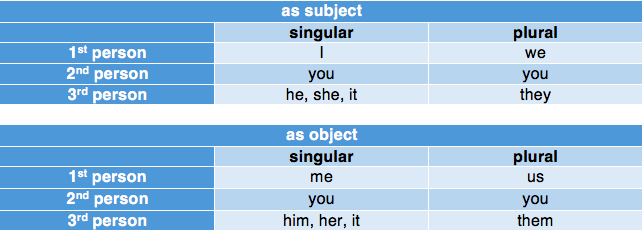Pronoun
A pronoun
is a word that is used instead of a noun or noun phrase. Pronouns refer to either a noun that has already been mentioned or to a noun that does not need to be named specifically.
kinds of pronoun
(1) Personal Pronoun
- जो सर्वनाम व्यक्तियों के लिए प्रयुक्त किए जाते हैं, Personal Pronoun कहलाते हैं। जैसे- I, we, he, she, our, your me, my, you, his, they etc.
(3) ReflexivePronoun-
जिन सर्वनामों में self या selves जुड़ा हुआ हो और जो प्रकट करें कि काम का प्रभाव कर्त्ता पर ही पड़ता है, Reflexive Pronoun कहलाते हैं।
- Rahul punished himself.
She painted the door herself.
(3) Emphatic Pronoun- ऐसे सर्वनाम जिनमें self या selves जुड़ा हुआ हो और जो कर्ता पर जोर डालते हों एवं subject के तुरंत बाद प्रयुक्त हो Emphatic Pronoun कहलाते हैं।
जैसे-I myself did it. She herself wrote the letter.
(4) Demonstrative Pronoun-
जो सर्वनाम किसी व्यक्ति या वस्तु की ओर संकेत करते हैं Demonstrative pronoun कहलाते हैं। जैसे This car is mine.
(5) Indefinite Pronoun-
जो सर्वनाम किसी निश्चित व्यक्ति या वस्तु की ओर संकेत नहीं करते, Indefinite Pronouns कहलाते हैं। जैसे - All men are mortal.
(6) Distributive Pronoun-
वे सर्वनाम जो कुछ व्यक्तियों या वस्तुओं में से प्रत्येक अथवा किसी एक की ओर संकेत करते हैं, Distributive Pronoun कहलाते हैं। जैसे-Each one is fine.
(7) Interrogative Pronoun- वे सर्वनाम जो प्रश्न पूछने का कार्य करते हैं, Interrogative Pronoun कहलाते हैं।
जैसे- Who will go to Jaipur
(8) Relative Pronoun-
जो सर्वनाम अपने पहले आई संज्ञा के लिए प्रयुक्त होते हैं, Relative Pronoun कहलाते हैं। जैसे-
I hate the person who always tells a lie.
The man who is wearing a black cap is my uncle.
(9) Exclamatory Pronoun-
आश्चर्य प्रकट करने वाले सर्वनाम Exclamatory Pronoun कहलाते हैं।
What a great news it is!
(10) Impersonal Pronoun-
जब सर्वनाम ऐसी
संज्ञा के लिए प्रयुक्त होते हैं जो अव्यक्त होती है, तो ऐसे सर्वनाम Impersonal Pronoun कहलाते हैं।
जैसे- It is raining. (it = water)
(11) Reciprocal Pronoun
- जब दो सर्वनाम एक साथ आएँ और पारस्परिकता का बोध कराएँ तो
उन्हें Reciprocal Pronoun कहते हैं। जैसे- Deepu and Rohit fought with each other.
(12) Possessive Pronoun:
वे Pronouns जो
Possession (अधिकार) show करते है,
Possessive Pronoun कहलाते हैं। ये निम्न हैं- my, mine, our, ours, your, yours, his, her, hers, it, its, one's, their, their's etc.
eg. - This book is mine.




No comments:
Post a Comment